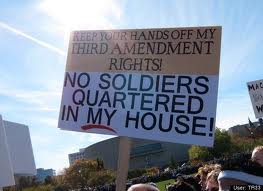The third amendment was introduced into the United States Constitution as a part of the Bill of Rights on September 5, 1789 and was ratified or voted for by three fourths of the states on December 15, 1791.
Breakdown...
- The Third Amendment is intended to protect citizens’ rights to the ownership and use of their property without intrusion by the government.
- The amendment bars the government from forcing individuals to provide lodging to soldiers in their homes, except during war when the interest of national security may override an individual’s right of private property.
- The Third Amendment works to protect the right of privacy, by giving everyone the right to stop soldiers from accessing their private property during peacetime.
Case: Quartering act 1774
Established June 2, 1774, the Quartering Act of 1774 was similar in substance to the Quartering Act of 1765.
- The Quartering Act of 1774 gave the governor, rather than the assembly, the authority to enforce necessary arrangements to ensure that the British troops were sheltered.
This video depicts how the third Amendment is still important in our culture today. This family was arrested for refusing police to enter home based on 3rd Amendment rights. The family was sent to prison for refusing to let police set up a lookout to spy on their neighbors based on a domestic violence dispute.

This image relays the message that quartering of troops would probably present more problems than prevent problems in times of war.

This image relays the message that quartering of troops would probably present more problems than prevent problems in times of war.
No comments:
Post a Comment